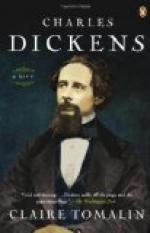Yes, except during the few years when he and his wife lived unhappily together, he was greatly attached to his home, with its friendships and simple pleasures; but yet, as I have said, a desire to see more of the world, and to garner new experiences, was strong upon him. The two conflicting influences often warred in his life, so that it almost seemed sometimes as if he were being driven by relentless furies. Those furies pointed now with stern fingers towards America, though “how” he was “to get on” “for seven or eight months without” his friends, he could not upon his “soul conceive;” though he dreaded “to think of breaking up all” his “old happy habits for so long a time;” though “Kate,” remembering doubtless her four little children, wept whenever the subject was “spoken of.” Something made him feel that the going was “a matter of imperative necessity.” Washington Irving beckoned from across the Atlantic, speaking, as Jeffrey had spoken from Edinburgh, of Little Nell and her far-extended influence. There was a great reception foreshadowed, and a new world to be seen, and a book to be written about it. While as to the strongest of the home ties—the children that brought the tears into Mrs. Dickens’ eyes,—the separation, after all, would not be eternal, and the good Macready, tragic actor and true friend, would take charge of the little folk while their parents were away. So Dickens, who had some time before “begun counting the days between this and coming home again,” set sail, as I have said, for America on the 4th of January, 1842.
And a very rough experience he, and Mrs. Dickens, and Mrs. Dickens’ maid seem to have had during that January passage from Liverpool to Halifax and Boston. Most of the time it blew horribly, and they were direfully ill. Then a storm supervened, which swept away the paddle-boxes and stove in the life-boats, and they seem to have been in real peril. Next the ship struck on a mud-bank. But dangers and discomforts must have been forgotten, at any rate to begin with, in the glories of the reception that awaited the “inimitable,”—as Dickens whimsically called himself in those days,—when he landed in the New World. If he had been received with princely honours in Edinburgh, he was treated now as an emperor in some triumphant progress. Halifax sounded the first note of welcome, gave, as it were, the preliminary trumpet flourish. From that town he writes: “I wish you could have seen the crowds cheering the inimitable in the streets. I wish you could have seen judges, law-officers, bishops, and law-makers welcoming the inimitable. I wish you could have seen the inimitable shown to a great elbow-chair by the Speaker’s throne, and sitting alone in the middle of the floor of the House of Commons, the observed of all observers, listening with exemplary gravity to the queerest speaking possible, and breaking, in spite of himself, into a smile as he thought of this commencement to the thousand and




